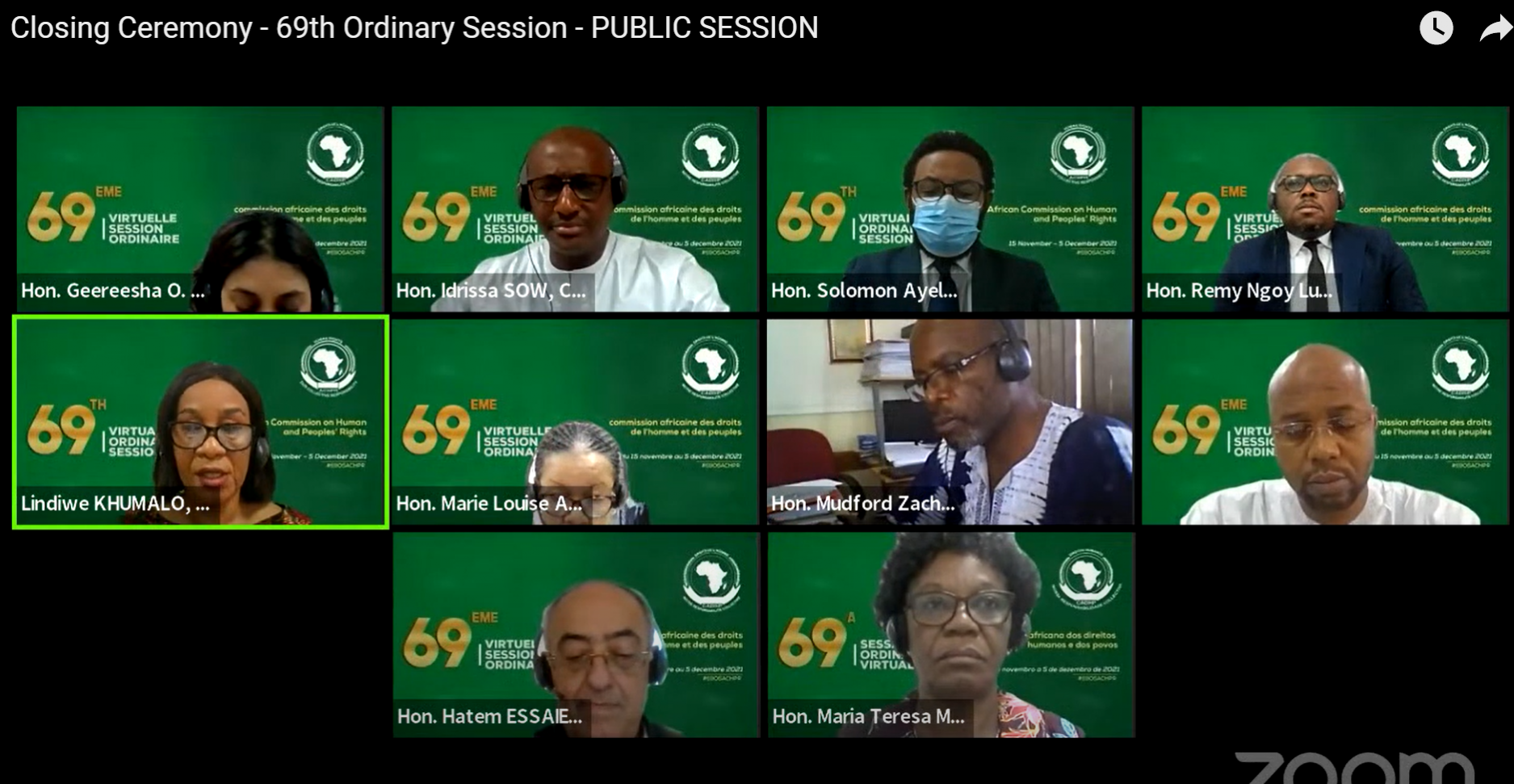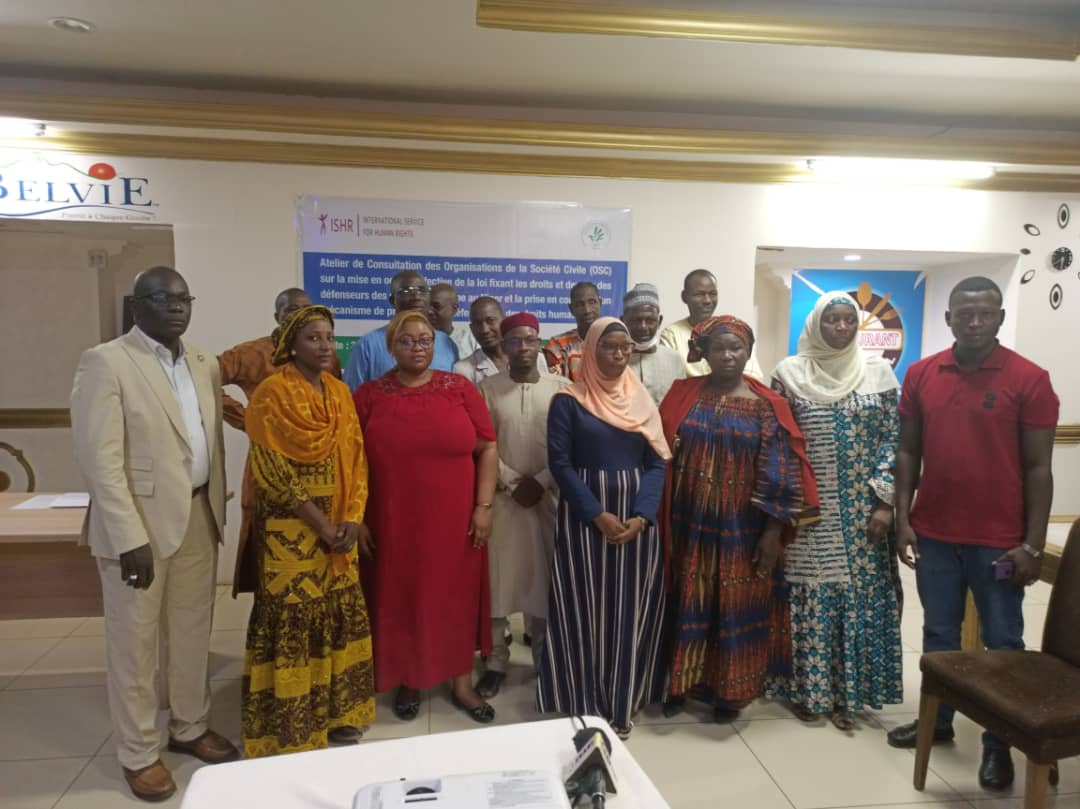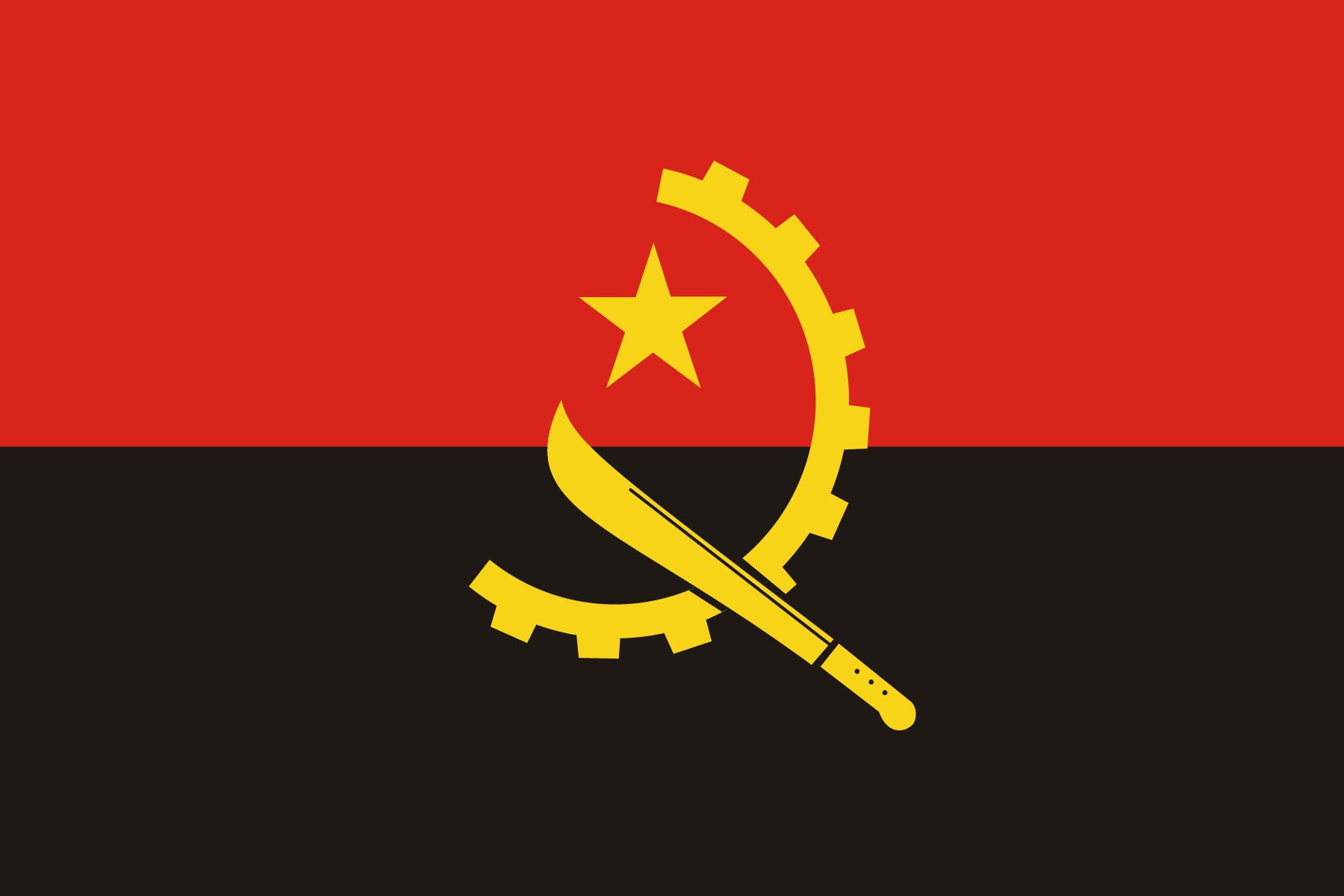The 69th public session of the ACHPR coincided with the celebration of the fortieth anniversary of the African Charter on Human and Peoples’ Rights adopted on 27 June 1981 by the Organisation of African Unity (now known as the African Union). It was also marked by the renewal of the Bureau and the appointment of three new Commissioners.
This session welcomed less participants than the last session. A total of 422 delegates took part in the session. This includes 101 States representatives from 24 countries, 11 representatives of African Union (AU) organs, 50 National Human Rights Institutions (NHRI), 5 international and intergovernmental organisations, 231 African and international NGOs, 5 other observers and 1 from the media.
During the opening ceremony, the various speakers noted the particular context of this session which coincides with the celebration of the 40th anniversary of the adoption of the African Charter on Human and Peoples’ Rights. The Charter has contributed to the development of international human rights law in Africa. But it is time to reflect on the milestones achieved in the last 40 years since the adoption of the Charter and in particular the challenges faced during the period of the Covid-19 pandemic. In addition they highlighted that the celebration is also an opportunity to re-evaluate the African human rights system through strengthening the channels of communication between the organs by joint activities, reinforcing the collaboration between member states and the Commission, as the obligation to protect human rights falls primarily on States.
Watch the open ceremony here
New Bureau and Members of the Commission:
On 15 November 2021, the Commission elected its new bureau for a two-year term. Honourable Rémy Ngoy Lumbu was elected as the Chairperson and Honourable Maya Sahli-Fadel was elected as the Vice-Chairperson. On another note, the African Union elected three new Commissioners and re-elected one. Indeed, Honourable Solomon Ayele Dersso, former Chairperson, was re-elected for a second term as Commissioner. Three new Commissioners were elected, namely: Honourable Commissioner Janet Ramatoulie Sallah-Njie (Gambia); Honourable Commissioner Ourveena Geereesha Topsy-Sonoo (Mauritius) and Honourable Commissioner Idrissa Sow (Senegal).
Watch the announcement here
States review:
On 19 and 20 November 2021, the Commission reviewed the 6th to 10th combined reports of Benin covering the period 2009-2018 on the legislative or other measures taken, with a view to giving effect to the rights and freedoms recognised and guaranteed by the African Charter. During its review, Benin emphasised that both the draft laws on associations and defenders are currently benefiting from the consultation and input of civil society. In addition, the National Commission also submitted its application for affiliated status to the African Commission in April 2021 and received a positive answer on 2 November 2021. ISHR and Changement Social Bénin submitted a shadow report ahead of the review of Benin.
On 22 and 23 November 2021, Namibia’s 7th periodic report and its 2nd report under the Maputo Protocol covering the period 2015-2019 was also review by the Commission. The Namibian delegation shared that, at various levels, the country has taken measures to reduce the digital divide, to ensure continuous access to internet and free access to networks and media as part of the draft law on freedom of expression that will soon be voted on, which will allow access to information through public or private entities. Ahead of the Review of the Republic of Namibia, ISHR and The Intersectional Network of Namibia submitted a shadow report to the African Commission which highlights the situation of LGBT communities and defenders.
Watch the review of Namibia here and here.
Watch the review of Benin here and here.
Observer status of NGOs
According to Resolutions 361 and the Resolution on granting Affiliate Status of the Commission, it granted affiliate status to the National Human Rights Commission of The Gambia and the Human Rights Commission of Benin as well as the Institut des droits de l’homme et de la Paix de l’Université Cheikh Anta Diop de Dakar and the Observer Status to 3 NGOs : l’Institut Panafricain pour la Citoyenneté, les Consommateurs et le Développement (CICODEV Afrique), the Paradigm Initiative for Information Technology Development and the Mouvement pour la défense de l’Humanité et l’abolition de la torture (MDHAT)
Watch it here
Human rights defenders in Africa
On 16 November, ISHR delivered a statement on the situation of human rights in Africa, with a particular focus on the criminalisation and arrest of women defenders in Sudan, of LGBTI defenders in Namibia and the progress made on legislative protection of defenders in Benin and Mali.
In line with the ACHPR’s rules of procedure, on 23 November 2021, the Special Rapporteur on human rights defenders and Focal point on reprisals in Africa, Commissioner Rémy Ngoy Lumbu, presented his intersession activity report. Following his presentation, ISHR delivered a statement highlighting the human rights violations committed in Sudan since the coup in October 2021, especially against women and women human rights defenders.
On Wednesday 24 November, Commissioner Solomon Ayele Dersso, Chairperson of the working group on extractive industries, environment and human rights violations in Africa (WGEI) presented his inter-sessional activity report. ISHR and the Liberian Civil Society Oil Palm Working Group read a statement on the critical situation of human rights and environmental defenders in Liberia.
Watch it here, here and here.
To conclude, the Commission adopted the following 23 Resolutions:
Countries Resolution:
- Resolution on the deterioration of the general human rights situation in Sudan following the coup of 25 October 2021;
- Resolution on the renewal of the mandate of the Commission of Inquiry into the situation in the Tigray Region of the Federal Democratic Republic of Ethiopia;
- Resolution on the situation of continued violation of human rights in the Republic of Cameroon;
Thematic Resolutions:
- Resolution on the recognition and protection of the right of indigenous and local peoples in Africa to participation, governance and use of natural resources;
- Resolution on the need for a training manual on the use of force by law enforcement officials and prison/correctional guards in Africa;
- Resolution on Extractive Industries and Land Rights of Indigenous People/Communities in Africa;
- Resolution on climate change and the effects on forced displacement;
- Resolution on violence against women in armed conflicts in Africa;
- Resolution on the development of standard operating procedures for the alert and reporting mechanism to the ACHPR on situations of torture and related acts;
- Resolution on the need for a General Comment on the prohibition of Female Genital Mutilation in Africa;
- Resolution on the extension of the period for the preparation of a Study on the Use of Force by Law Enforcement Officials in Africa;
Resolution on special Mechanisms:
- Resolution on the reallocation of the Country Rapporteur functions among the Commissioners ;
- Resolution on the recomposition of the Resolutions Committee;
- Resolution on the recomposition of the Working Group on Indigenous Populations/Communities in Africa;
- Resolution on the re-constitution of the Advisory Committee on Budgetary and Personnel Matters;
- Resolution on the recomposition of the Working Group on Specific Issues related to the work of the Commission;
- Resolution on the recomposition of the Working Group on the Death Penalty, Extrajudicial, Summary or Arbitrary Executions and Enforced Disappearances in Africa;
- Resolution on the Recomposition of the Committee on the Protection of the Rights of People Living with HIV (PLHIV) and People at Risk, Vulnerable and Affected by HIV;
- Resolution on the recomposition of the Working Group on Communications;
- Resolution on the mandate and appointment of the Special Rapporteur on freedom of expression and access to information in Africa;
- Resolution on the appointment of the Special Rapporteur on the Rights of Women in Africa;
- Resolution on the recomposition of the Working Group on Extractive Industries, the Environment and Human Rights Violations in Africa;
- Resolution on the recomposition of the Working Group on the Rights of Older Persons and Persons with Disabilities in Africa;




